| CAS NO: | 34157-83-0 |
| 规格: | ≥98% |
| 包装 | 价格(元) |
| 25mg | 电议 |
| 50mg | 电议 |
| 100mg | 电议 |
| 250mg | 电议 |
| 500mg | 电议 |
| 1g | 电议 |
| Molecular Weight (MW) | 450.61 |
|---|---|
| Formula | C29H38O4 |
| CAS No. | 34157-83-0 |
| Storage | -20℃ for 3 years in powder form |
| -80℃ for 2 years in solvent | |
| Solubility (In vitro) | DMSO: 90 mg/mL (199.7 mM) |
| Water: <1 mg/mL | |
| Ethanol: <1 mg/mL | |
| Other info | InChi Key: KQJSQWZMSAGSHN-JJWQIEBTSA-N InChi Code: InChI=1S/C29H38O4/c1-17-18-7-8-21-27(4,19(18)15-20(30)23(17)31)12-14-29(6)22-16-26(3,24(32)33)10-9-25(22,2)11-13-28(21,29)5/h7-8,15,22,31H,9-14,16H2,1-6H3,(H,32,33)/t22-,25-,26-,27+,28-,29+/m1/s1 SMILES Code: O=C([C@@](CC[C@]1(C)CC[C@]2(C)C3=CC=C4C(C)=C5O)(C)C[C@@]1([H])[C@]2(C)CC[C@@]3(C)C4=CC5=O)O |
| Synonyms | Celastrol; Tripterin; Tripterine; |
| In Vitro | In vitro activity: Celastrol at 5 μM inhibits the chymotrypsin-like, PGPH-like, and trypsin-like activities of the purified 20S proteasome by 80%, 5%, and<1%, respectively, whereas at 10 μM, it inhibits these three proteasomal activities by ~90%, 15%, and <1%, respectively. Celastrol significantly inhibits the proteasomal chymotrypsin activity in PC-3 cells in a concentration-dependent manner. Celastrol at 2.5 μM to 5 μM induces caspase-3 activity by 4.7-fold to 5.5-fold in PC-3 cells. Celastrol (5 μM) treated cells, the levels of the proteasome target proteins, IκB-α and Bax, are increased after 1 hour and further increased to its peak for 4 hours to 12 hours. Celastrol (2.5 μM) treatment induces proteasome inhibition by 40%, as shown by the decreased levels of chymotrypsin-like activity and increased accumulation of ubiquitinated proteins in LNCaP cells. Celastrol (2.5 μM) induces apoptosis in the Celastrol-treated LNCaP cells, as shown by increased levels of caspase-3 activity (up to 3.5-fold), PARP cleavage, and apoptotic morphology. Celastrol (300 nM) is found to suppress LPS-induced production of TNF-alpha and IL-1beta by human monocytes and macrophages. Celastrol (100 nM) also decreases LPS-induced expression of class II MHC molecules by microglia. Celastrol strongly inhibits LPS and IFN-y-induced NO production with IC50 of 200 nM in macrophage lineage cells. Celastrol strongly inhibits TNF-α and IFN-γ-induced NO production with IC50 of 200 nM in endothelial cells. Kinase Assay: A purified rabbit 20S proteasome (0.1 μg) is incubated with 40 μM of various fluorogenic peptide substrates in 100 μL assay buffer (20 mM Tris-HCl (pH 7.5)), in the presence of Celastrol at different concentrations or in the solvent DMSO for 2 hours at 37 ℃, followed by measurement of inhibition of each proteasomal activity. Cell Assay: The anti-proliferative effect of celastrol on various human tumor cell lines is determined by the MTT uptake method. Briefly, 5×103 cells are incubated with Celastrol in triplicate in a 96-well plate at 37 ℃. MTT solution is then added to each well. After a 2 hours incubation at 37 ℃, extraction buffer (20% SDS, 50% dimethylformamide) is added, cells are incubated overnight at 37 ℃, and the optical density is then measured at 570 nm using a Tecan plate reader. |
|---|---|
| In Vivo | Celastrol (3 mg/kg) results in significant inhibition (up to 70%) of tumor growth in male nude mice bearing PC-3 tumors, associated with increased p27 levels and Bax level. Celastrol (3 mg/kg) results more apoptotic tumor cells with the appearance of various PARP cleavage fragments in tumor of male nude mice bearing PC-3 tumors. Celastrol (3 mg/kg) causes 35% of tumor inhibition, associated with decreased proteasome activity and decreased expression of AR protein in nude mice bearing C4-2B tumors. Celastrol (3 mg/kg) is found to suppress strongly joint swelling and other manifestations of adjuvant arthritis in mice. Celastrol (0.2 mg/kg) significantly improves the performance in memory, learning and psychomotor activity tests in rats. |
| Animal model | Nude mice bearing C4-2B tumors |
| Formulation & Dosage | Dissolved in 10% DMSO, 70% Cremophor/ethanol (3:1), and 20% PBS; 3 mg/kg; i.p. administration |
| References | Cancer Res. 2006 May 1;66(9):4758-65; Prog Neuropsychopharmacol Biol Psychiatry. 2001 Oct;25(7):1341-57. |
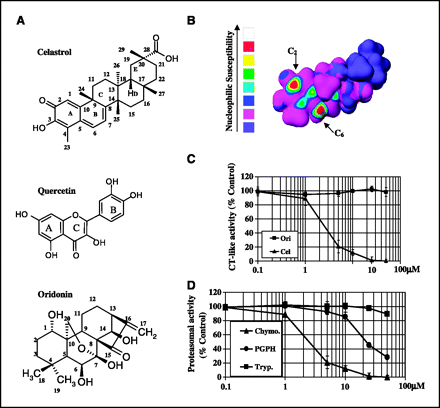 | 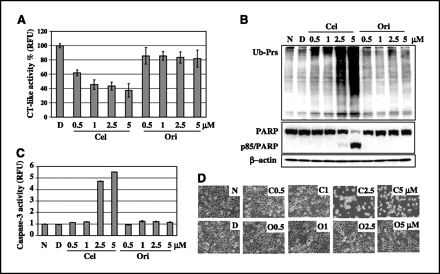 | 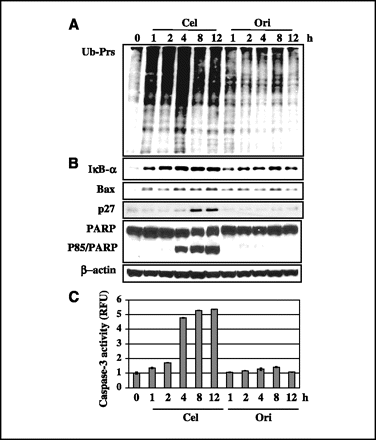 |
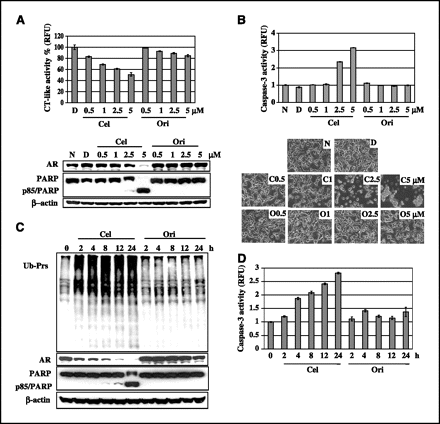 | 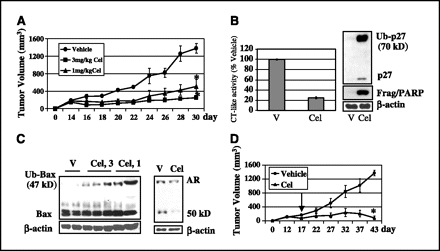 | 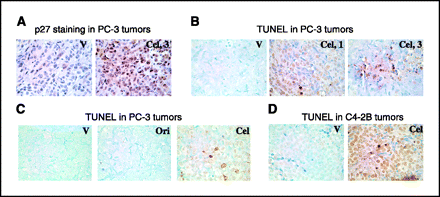 |
